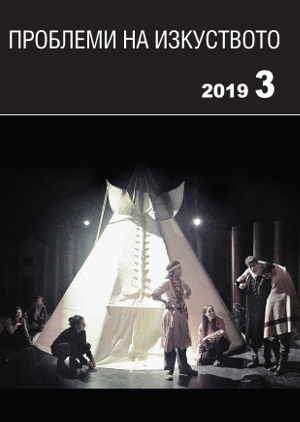Настроения за реформи в българския театър през 70-те години на ХХ век
Aspiring to reform the 1970s Bulgarian theatre
Author(s): Rumiana NikolovaSubject(s): History, Theatre, Dance, Performing Arts, Fine Arts / Performing Arts, Recent History (1900 till today)
Published by: Институт за изследване на изкуствата, Българска академия на науките
Summary/Abstract: The mode of functioning of Bulgarian theatre radically changed in the period 1944–1956. Its management was centralised. The repertories were controlled seeking to impose ideologically ‘right’ texts. Soviet and the then contemporary Bulgarian plays were central to the repertoires. The other fundamental changes stemmed from the imposition of Socialist Realism as the sole right and admissible method along with the Stanislavski’s method applied in a simplified and ideologised version. The expansion of the network of theatres was a result of awakening to the propagandic potentials of theatre. The changes aimed at subordinating theatre to the ideas of the communist ideology and its total Sovietisation. The alternation between short periods of liberalisation and of stagnation in cultural life, as well as the demagogic policy pursued by the authorities concerning artistic freedom may be generalised as a prevailing characteristic of the period after 1956 until the late 1960s. Theatric activities were shaped as a matter of priority by opportunistic artists, but differed from the preceding period in the responses by other artists that showed themselves in much freer discussion and their works to the policies pursued by the authorities. Comparatively, the 1970s were much quieter. On the one hand, the communist regime stabilised due to the complete Soviet support and on the other, the creative clerisy had lost their faith in any possible reforming of the Eastern Bloc in the wake of the crushing of the Prague Spring. The authorities’ will for reforming theatre was in tune with the party line towards merely cosmetic changes within the framework of Socialism, seeking to justify the unfeasible idealised communist perspective. The results were witnessed in building of facilities and equipment, an increase in the tours by companies, directors and artists, opening of second stages in many cities. The sector readily responded to the authorities’ will for changes demonstrating determination to professionalise at all levels: repertoires (good translations, information about new plays, etc.), directing, acting skills, criticism, management through the desire to open Bulgarian theatre to the world experience. The aspirations to reform the 1970s Bulgarian theatre were overlaid on top of the creative momentum gathered in the previous period (1956–1968) allowing Bulgarian theatre to develop in a tad steadier environment, but constantly reaffirming the basic framework. At the same time, the entire cultural policy pursuing to open up to the world and push the boundaries of Socialist Realism resulted in exchanging ideas, which were to come to fruition in the next decade.
Journal: Проблеми на изкуството
- Issue Year: 2019
- Issue No: 3
- Page Range: 35-39
- Page Count: 5
- Language: English, Bulgarian
- Content File-PDF

